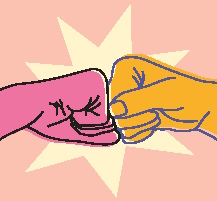The Challenge of Keeping Friends
Caroline Maguire, MEd, ACCG, PCC
Download PDF
It’s Not Always Your Fault When It Ends
 Most people who identify as having ADHD have a long, and often complicated, history with friends. We often have an equally long history of feeling misunderstood in social situations because we were “too much” for some people, leaving us feeling that we caused conflict, worried that we misread social signals, and more.
Most people who identify as having ADHD have a long, and often complicated, history with friends. We often have an equally long history of feeling misunderstood in social situations because we were “too much” for some people, leaving us feeling that we caused conflict, worried that we misread social signals, and more.
Such circumstances may cause us to jump to the conclusion that whatever the negative outcome, “it must have been my fault.” Somehow, it was me.
This leads to a lifetime of experiences where we reinforce by our own beliefs that the negativity around us was, in fact, because of us. Leading further to a cycle of shame, low self-confidence, and sometimes social anxiety.
Yes, it is true that people with ADHD sometimes struggle with friendship, but doesn’t the entire population? Perhaps not always in the same ways, but even with our challenges, it’s important to acknowledge that we deserve to be treated well and not merely cast aside to have complicated, dismal relationships.
People with ADHD have much to offer their friends.
There is joy and laughter to be found in how spontaneous we can be. There is fun to be had by not living by the rules all the time. There is levity found in not being so rigorously tied to social norms.
In life, there is a balance between trying to be a better friend and accepting something limiting about ourselves. No one should be treated poorly simply because of a difference in learning style and brain function. People with ADHD deserve love, compassion, affection, and enjoyment in their friendships just like everyone else.
So, if you’re curious whether you’re someone who has a deeply held belief that it must be your fault because a friendship or relationship didn’t work out, I have five ways for you to check this assumption for how factual it is.
Because the goal is to work with your ADHD, not let it paint you into a box or category.
Here are my five foolproof ways to check the assumption that “it must be me.”
- Do you always take the blame?
The first red flag is when you’re always the one in the wrong. Friendship should be a two-way street. It requires trust and reciprocity. If you always apologize, always take the blame, always initiate “getting together” only to constantly hear from your friends about your foibles, then you are not being treated well. Owning your behavior is important, but always owning every mistake, every fight, and every mishap is too much and borderline unfair and untrue. - Evaluate how friends treat you.
Explore how your friends treat you. Do they celebrate your successes? Or do they pick on or point out your losses? Are they happy for you when life goes your way, or do they degrade or belittle you when they can? How supportive and interested are they in your life and dreams? Do they listen to your problems? Are they jealous of you? Do they compare you to other people? - Do you show up as a good friend?
There are several traits that research shows are essential to friendship. Check in with yourself and see if you are presenting these traits to friends or if there are aspects you need to work on.

- Are you trustworthy?
- Are you honest?
- Are you supportive of others?
- Are you loyal?
- Are you a good listener?
- Do you show empathy for others?
- Do you show up when someone needs you?
- Check your relationship expectations.
There are different levels of intimacy in friendship, and that means that it’s normal for trust to build over time. If you’re expecting someone to act as a best friend overnight, this is unrealistic for most lifelong friends. Ask yourself where your friendship really is. Has it been a short amount of time? Perhaps this person is more of an acquaintance than your most intimate close friend.Sometimes, when assumptions are made about how “deep” a friendship is, it can be confusing and even off-putting, causing a friend to set some boundaries to understand your deep interest in them. You’ll experience this when a friend suddenly doesn’t have time for you or they have other friends with whom they are also spending time.When you react to the boundaries by escalating it as an issue, sometimes people pull away even further. This is a great sign that your expectations for the friendship were misaligned and may need to be looked at so you don’t get hurt or unknowingly push someone away. - Look at patterns in the way people treat you or react to you.
One mistake or comment does not make a pattern. Patterns are repeated behaviors, not one behavior. Be careful to not assume a pattern of behavior exists and then, let the story in your head become the truth.If one person tells you something that bothers them about you, listen to their feelings with curiosity, but not as a fact. Then, ask yourself if anyone else has ever said something similar to you. If you can bring together several people (maybe as many as ten), then you’re likely looking at a pattern to explore. But, without that evidence, you’re being unkind to yourself when you assume that one person’s opinion about your character is a fact.
ULTIMATELY, FRIENDSHIPS SHOULD BE ENJOYABLE AND FUN and make you feel supported and appreciated. Everyone has strengths and weaknesses, but true friends see the positives you offer.
 Caroline Maguire, MEd, ACCG, PCC, holds a master’s degree with a specialization in social emotional learning from Lesley University. She is the author of Why Will No One Play with Me, an award-winning book designed to coach emotional regulation, social and self-awareness, and responsible decision-making skills. She founded the Fundamentals of ADHD Coaching for Families training program at the ADD Coach Academy, which is accredited by ICF. Visit her website, CarolineMaguireAuthor.com, follow her @AuthorCarolineM and download her free video, How to Tell a Tighter Story.
Caroline Maguire, MEd, ACCG, PCC, holds a master’s degree with a specialization in social emotional learning from Lesley University. She is the author of Why Will No One Play with Me, an award-winning book designed to coach emotional regulation, social and self-awareness, and responsible decision-making skills. She founded the Fundamentals of ADHD Coaching for Families training program at the ADD Coach Academy, which is accredited by ICF. Visit her website, CarolineMaguireAuthor.com, follow her @AuthorCarolineM and download her free video, How to Tell a Tighter Story.
Other Articles in this Edition
The Challenge of Keeping Friends
Is ADHD Related to Eating Difficulties?
Cognitive Disengagement Syndrome
EpicWin as Game-Based Self-Management
Why Are Black Preschoolers with ADHD Expelled?
Launching Successful Young Adults with ADHD
Beware These Sneaky Energy Vampires
How I Manage My Improv-Based Training Business with ADHD
